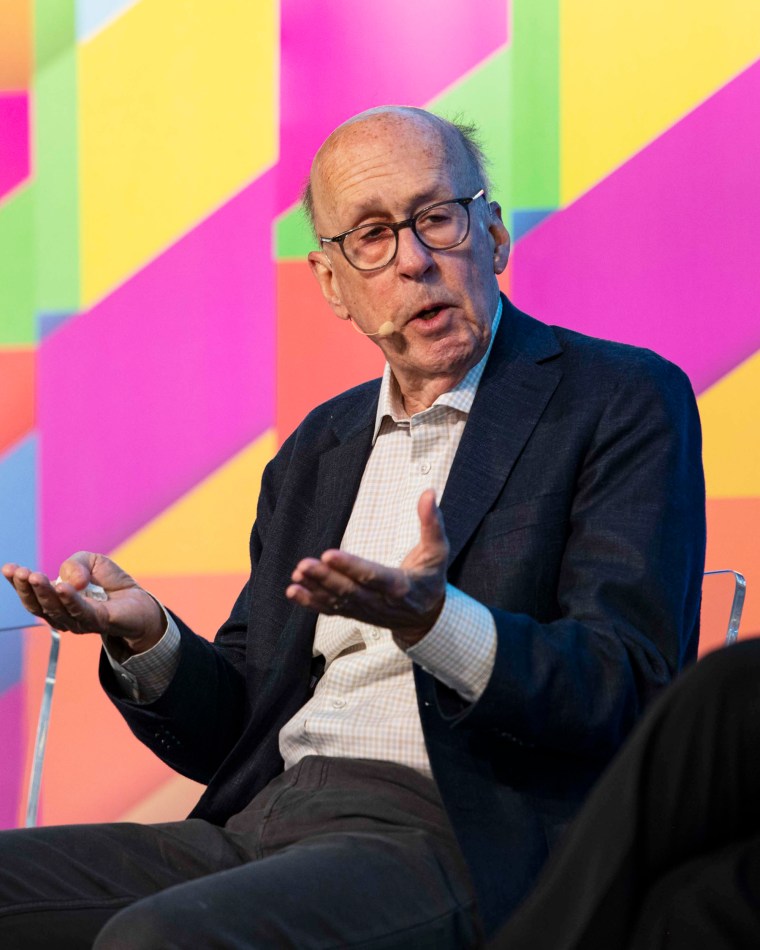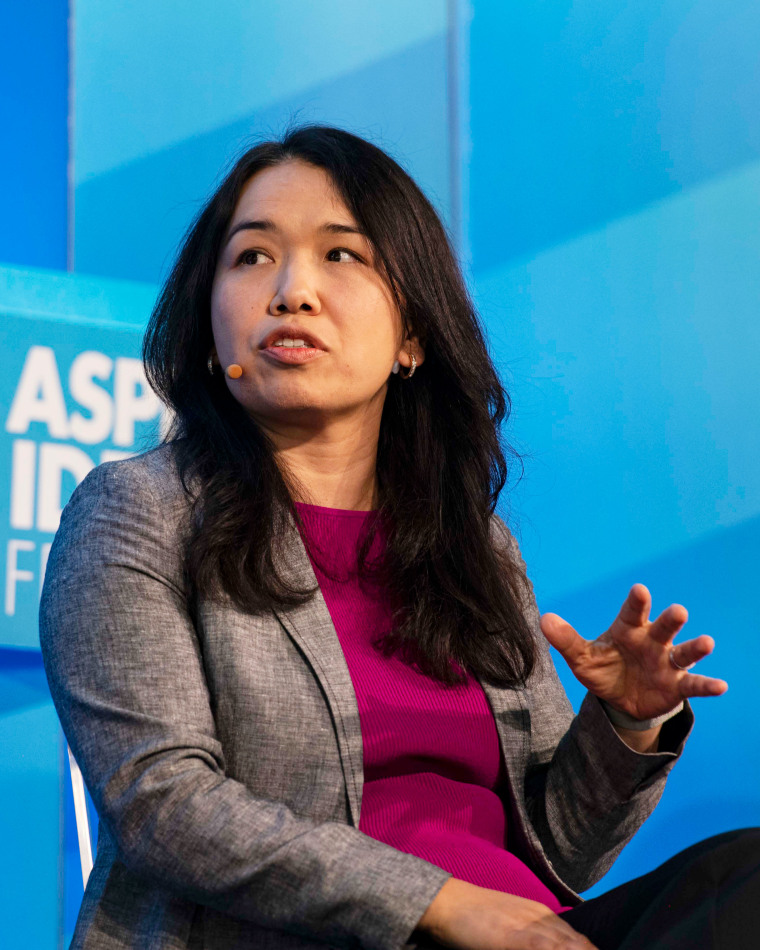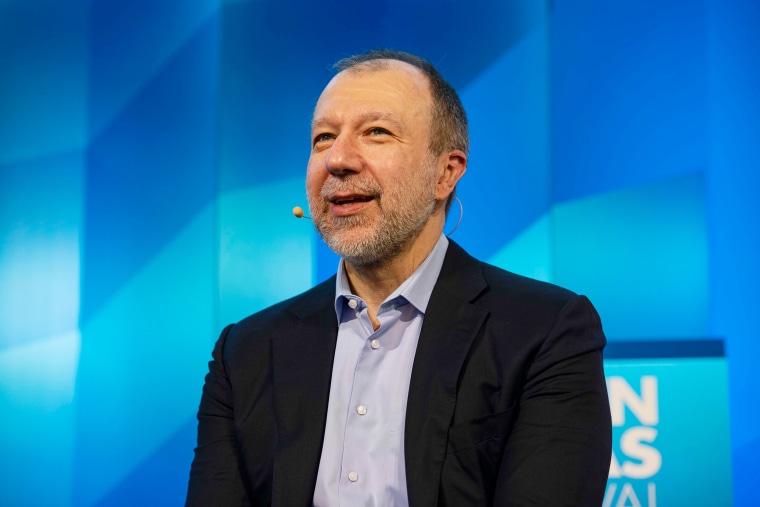What to know about the 2023 Aspen Ideas Festival
- The Aspen Ideas Festival is hosted by the Aspen Institute, a nonprofit organization founded in 1949 that aims to “change through dialogue, leadership, and action to help solve the most important challenges facing the United States and the world.”
- Today's panel includes Jessica Chen Weiss, the Michael J. Zak professor for China and Asia-Pacific studies at Cornell University; Elbridge Colby, co-founder and principal of The Marathon Initiative and a former deputy assistant secretary of defense for strategy and force development; Jorge Guajardo, a partner at Dentons Global Advisors and a former Mexican ambassador to China; and Stephen Roach, senior fellow at the Paul Tsai China Center at Yale Law School. Rebecca Blumenstein, NBC News' president of editorial, will moderate.
- NBCUniversal News Group is the media partner of the Aspen Ideas Festival.
And that’s a wrap!
Plenty to digest, a lot to be concerned about, but some reasons for optimism.
That’s also our last panel of the Aspen Ideas Festival. Thanks to everyone who has followed our coverage.
Panelists' recommendations
Stephen Roach: We need a new architecture of engagement and a full-time organization looking at all aspects of the China-U.S. relationship.
Jessica Chen Weiss: We need to work more on deterring rather than provoking, and focus on ourselves rather than slowing China down.
Elbridge Colby: Speak softly and carry a big stick. Focus provocation on military preparedness rather than rhetoric or economic decoupling.
Jorge Guajardo: China’s demographic decline, most notably the decline of its working-age population, opens the question of the future of the world’s manufacturing.
Military buildup — good or bad?
The most interesting exchanges of the panel have been between Jessica Chen Weiss and Elbridge Colby, who offer counterpoints on the use of military buildup as a deterrent on China.
Colby sees military deterrence as crucial, while Weiss has said such military buildup is only inflaming tensions and pushing China to respond in kind.
A Cold War is not a good place to be
Stephen Roach pushed back on Elbridge Colby's earlier comments about the desirability of a Cold War, saying a Cold War is not a good place to be.
He said he agreed with Colby that the approach to the relationship with China does need to change, but that he hopes it would be more economy-focused.
“The way in which we are managing this relationship is not working,” Roach added.

Nobody outside of China knows what government is thinking on Taiwan
Asked by Rebecca Blumenstein about the situation with Taiwan, Guajardo cautioned that nobody outside of China’s government really knows what China’s government is thinking.
He noted that the global view of China is of a country that is hard to work with, and that there would be consequences for China if it tried to take self-ruling Taiwan.
“Nobody is prone to side with China on this right now,” Guajardo said.
'We'd be lucky to get into a Cold War'
President Xi Jinping seems to be a leader “on the more aggressive side,” Elbridge Colby said.
He said Xi links his country's development and future to capturing Taiwan, a self-ruling democracy about 100 miles off China that Beijing claims as its territory.
“I actually think we’d be lucky to get into a Cold War,” he said.
Stephen Roach pushed back, saying a Cold War is not a good place to be. He said he agreed with Colby that the approach to the relationship with China does need to change, but that he hopes to take a more economy-focused approach.
“The way in which we are managing this relationship is not working,” Roach said.
Xi Jinping's strength masks 'deep insecurity'
When Rebecca Blumenstein asked about President Xi Jinping's ambitions, Jessica Chen Weiss said his apparent strength masks “deep insecurity.”
“A lot of the measures that you’ve seen him adopt abroad but also domestically are really an effort to shore up the security of one-party rule in China,” she said, pointing out how few Communist regimes remain around the world.
Weiss said that while she disagrees with Elbridge Colby on many things, they both want to get to the same conclusion. She said she doesn’t want to wait 10 to 15 years to see if we can avoid a military conflict.
“I don’t want to relive the kind of eyeball-to-eyeball crises, the Cuban missile crisis,” she said.
China getting too powerful to resist for some countries
Asked by Rebecca Blumenstein what he’s most worried about, Jorge Guajardo said he’s very concerned about Chinese economic coercion.
He said that countries that try to resist Chinese companies coming to their markets will face coercion, and that China is getting too powerful to resist.
Beijing's view: U.S. is trying to 'strangle' China
China’s view is that the U.S. is trying to “strangle” China, and that it’s crucial to “get the military balance right,” Elbridge Colby said.
China is working to expand its economic influence, but he added that those efforts are starting to face pushback and he is worried that could precipitate the use of military force.
He pointed to China’s growing military as evidence for this danger.
“The real question to me is how do we deter China from doing that but also give it a graceful exit, basically a better alternative?” he said.

Efforts to slow China could end up harming the U.S.
Jessica Chen Weiss said that efforts to slow China could end up harming the U.S., societally but also economically.
She noted that it is now harder for high-skilled people to enter the U.S. and that many people who already came to the U.S. do not feel safe.
“We need to take very good care that we don’t end up undoing the various sources of our strength,” Weiss said.

Roach warns of 'growth quagmire'
Asked by Rebecca Blumenstein about concerns over China’s economy, Stephen Roach said a Chinese economic decline could lead it to be more likely to lash out at adversaries.
He pointed to Japan’s economic stagnation as something that China could endure.
“If he gets in a Japanese like growth quagmire, then he’s going to be much more aggressive to deflect attention away from the problems,” Roach said of Chinese President Xi Jinping.
U.S.-Chinese relations boring?
Jorge Guajardo offered a moment of levity, calling the U.S.-China relationship “the most boring aspect” of China’s diplomatic relations
“I find it much more interesting to see how China engages with other countries in the world, countries like the Philippines, which were long allies of the United States,” he said.
Guajardo said many countries are trying to decide how to deal with China, pointing to European countries. Europe, he said, faces a choice in whether it will embrace Chinese manufacturing of electric vehicles.
“If a Chinese car manufacturer tried to set up shop in United States, there would be congressional hearings. There would be accusations of spying,” he said. “So it’s not happening in the United States. It’s happening in other parts of the world.”

U.S.-China tension in 'an action-reaction spiral'
Jessica Chen Weiss called current China-U.S. tensions “an action-reaction spiral” and said it’s crucial to slow this to avoid conflict.
"Frankly, the whole world is jumping up and down and saying, 'Cool it, guys,'" she said.
But Weiss added that she does not yet see concrete steps taken by either country to reduce tensions, adding that she worries that the U.S. political atmosphere has incentivized politicians to target China.
“I don’t actually think we are at aiming at the kinds of potential reciprocal concessions that would be and kind of steps back from the brink,” she said.

Growing bipartisan agreement on China
There is growing bipartisan agreement that China is a threat, but that there remains some underestimation of China’s capabilities, Elbridge Colby said.
“My fear is that we are talking a lot about China, but basically the mental models, strategic model, is more or less the same,” he said.
Stephen Roach backed up Jorge Guajardo’s point about false pretenses, which Roach said are on both sides of the China-U.S. relationship. He noted that the U.S. trade deficit is not just with China but with many countries, and that the U.S. shouldn’t blame its trade deficit just on China — something that also happens in the other direction.
“This bipolar blame game has now escalated into the high-octane fuel of conflict escalation that can be ignited by sparks,” Roach said.
Washington-Beijing relations at a low ebb
Relations between the planet’s two biggest economies have been at a low ebb amid a range of issues including trade, human rights, Taiwan, Russia’s war in Ukraine and a Chinese surveillance balloon that flew over the U.S. earlier this year.
Secretary of State Antony Blinken's high-stakes trip to Beijing earlier this month was aimed at reducing spiraling tensions. President Joe Biden calling Chinese President Xi Jinping a dictator last week again ramped up animosity.
The way forward on China?
It’s a cool, crisp morning in Aspen, where we’ll be wrapping up our Ideas Festival coverage with a panel discussing America’s relationship with China.
The panel includes Jessica Chen Weiss, the Michael J. Zak professor for China and Asia-Pacific studies at Cornell University; Elbridge Colby, co-founder and principal of The Marathon Initiative and a former deputy assistant secretary of defense for strategy and force development; Jorge Guajardo, partner at Dentons Global Advisors and a former Mexican ambassador to China; and Stephen Roach, senior fellow at the Paul Tsai China Center at Yale Law School.
Rebecca Blumenstein, NBC News' president of editorial, will moderate.

